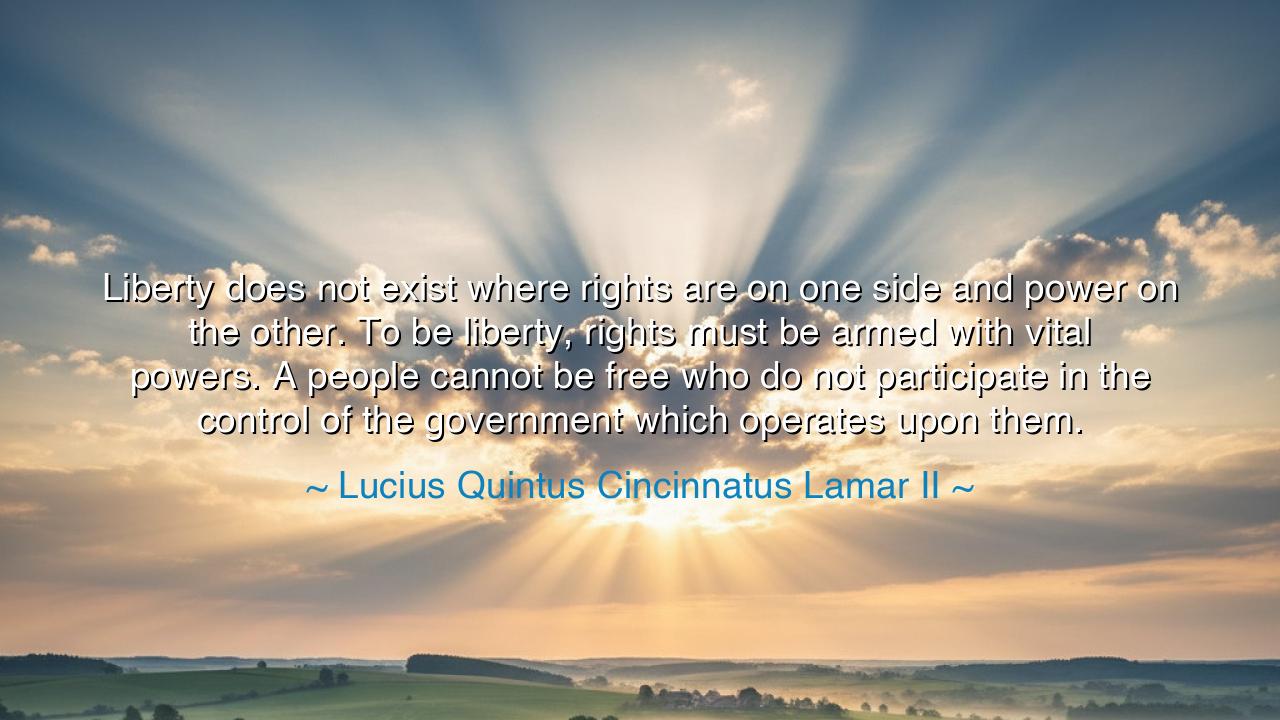
Liberty does not exist where rights are on one side and power on
Liberty does not exist where rights are on one side and power on the other. To be liberty, rights must be armed with vital powers. A people cannot be free who do not participate in the control of the government which operates upon them.






In the solemn cadence of history’s voice, few truths ring as powerfully as those spoken by Lucius Quintus Cincinnatus Lamar II, a statesman of the nineteenth century whose wisdom still burns with undiminished flame: “Liberty does not exist where rights are on one side and power on the other. To be liberty, rights must be armed with vital powers. A people cannot be free who do not participate in the control of the government which operates upon them.” These words, born from the furnace of a nation torn and reformed by civil war, are not merely the reflections of a judge—they are the cry of a philosopher, a patriot, and a prophet of freedom. Lamar saw that liberty is not a gift bestowed by rulers, but a force that must live and breathe in the hearts and actions of the governed.
He spoke at a time when the United States, bruised by division and reconstruction, stood uncertain between unity and tyranny. The air was filled with debates on states’ rights, federal authority, and the meaning of freedom itself. Lamar understood that liberty cannot survive when the rights of the people are weak, hollow, or unarmed against the encroaching power of government. Rights written on parchment are fragile if not defended by the living spirit of participation, vigilance, and courage. True liberty, he warned, does not dwell where power acts alone and citizens remain silent.
The origin of Lamar’s conviction reaches back to the ancient soil of the Roman Republic, whose very name became the symbol of civic virtue. There, the citizens knew that freedom required more than protection—it required participation. In the days of Cincinnatus, the farmer-general from whom Lamar drew part of his name, the Roman people understood that liberty demanded duty. When Rome was threatened, Cincinnatus left his plow, took command, and, when the danger was past, returned to his fields rather than cling to power. Lamar invoked this legacy, for he knew that a government’s health depends upon the moral strength of its citizens. A people who abandon their right to rule themselves invite the chains of masters.
Throughout history, nations have perished when rights and power stood apart. In France, before the Revolution, the monarch wielded absolute power, and the rights of the common people existed only in whispers and petitions. The law was a tool of kings, not a shield for the citizen. When that balance broke, when rights could no longer defend themselves, the flood of revolution swept through the land, and liberty was purchased in blood. Lamar’s words echo this same eternal truth: rights must be armed with vital powers—not merely the power of arms, but the power of voice, of law, of active governance. For the sword defends freedom’s body, but participation preserves its soul.
To participate in the control of government is not a luxury of democracy—it is its lifeblood. Lamar’s warning cuts deep into the heart of apathy: a people who grow indifferent to their government’s actions, who vote without thought or fail to vote at all, who see politics as corruption rather than duty, surrender the very essence of liberty. Freedom is not kept by those who wait for others to act; it is kept by those who engage, question, and hold their rulers to account. For power unobserved grows arrogant, and rights unexercised grow faint.
Let us remember also the tale of the American Revolution, when ordinary men and women—farmers, merchants, blacksmiths—rose against a distant power that claimed to govern without their consent. Their rallying cry was not for wealth or conquest, but for representation—for the right to have a hand in the laws that bound them. They understood what Lamar would later put to words: that a people cannot be free if they do not shape the government that shapes their lives. Their courage proved that liberty, to live, must act; it cannot rest idle in the hearts of those unwilling to defend it.
The lesson Lamar gives us is both ancient and urgent: liberty dies not in thunder, but in silence. When citizens cease to watch, power ceases to listen. Rights that are not used are easily ignored, and freedom that is not practiced is quietly lost. Therefore, every man and woman who would remain free must become a participant in their own governance—by casting a vote, by speaking truth, by questioning authority, by standing firm when justice trembles. To live in liberty is to shoulder its weight, for freedom is not the absence of duty but the triumph of it.
So, my child of the republic, remember this as you walk in the sunlight of freedom: rights and power must walk hand in hand, or both will perish. Let your voice be a sword of conscience and your reason a shield of truth. Never surrender the sacred task of participation to others, for no one may govern your destiny but you. The fountain of liberty flows only when every citizen pours into it their vigilance, their virtue, and their will. For as Lucius Quintus Cincinnatus Lamar II taught, the people are free only so long as they hold the reins of power—and never forget that freedom demands the hand that guides it.






AAdministratorAdministrator
Welcome, honored guests. Please leave a comment, we will respond soon